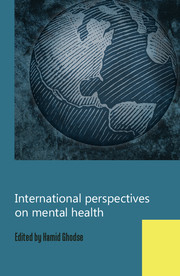Trinidad and Tobago
from South America
Published online by Cambridge University Press: 02 January 2018
Summary
The Republic of Trinidad and Tobago is the most southerly of the Caribbean island states. Trinidad is just 14 km from the coast of Venezuela. Trinidad covers an area of 4828 km2 while Tobago, the sister isle, has an area of 300 km2. The total population is approximately 1.3 million; 40.3% of the population is of East Indian descent, 39.6% of African descent, 18.4% mixed and 1.7% belong to other ethnic groups (Central Statistical Office, 2001). St Ann's Hospital in Port of Spain, the capital, was established in 1900 and is the country's only psychiatric hospital. There are two general hospitals, one in the north, at Port of Spain, and the other in the south, at San Fernando.
The per capita gross domestic product (GDP) is US$8948 and total health expenditure represents 5.2% of GDP. Life expectancy at birth is 67.3 years for males and 72.6 years for females; a healthy life expectancy at birth is projected at 58.9 years for males and 62.0 years for females. Adult mortality is 235 per 1000 population for males and 150 per 1000 population for females; the male child mortality rate per 1000 population is 24 and the female rate is 18 per 1000 population (World Health Organization, 2004). The literacy rate for males is 95.3% and that for females is 91.5% (World Health Organization, 2002).
Early mental health policies (1848–1975)
Under British rule, the early treatment policies of the mentally ill in Trinidad paralleled the treatment of the insane in Britain. In 1848, an ordinance was passed to detain the criminally insane at the Royal Gaol. The Belmont Lunatic Asylum was established in 1858. The facility later transferred to the St Ann's Asylum, now renamed the St Ann's Hospital. For the following five decades, policies of treatment were custodial, with the use of malaria therapy for syphilis, insulin coma therapy, bromide mixtures, veronal and sulphonal, transorbital leucotomy, electroconvulsive therapy and immersion therapy in cold water.
The advent of chlorpromazine and the open-door policy of the 1950s heralded a period of aggressive treatment outside the hospital, with an emphasis on decentralisation and deinstitutionalisation as models of care. In that decade, two plans were also submitted: the Julien report of 1957 and the Lewis plan of 1959.
- Type
- Chapter
- Information
- International Perspectives on Mental Health , pp. 476 - 480Publisher: Royal College of PsychiatristsPrint publication year: 2011



